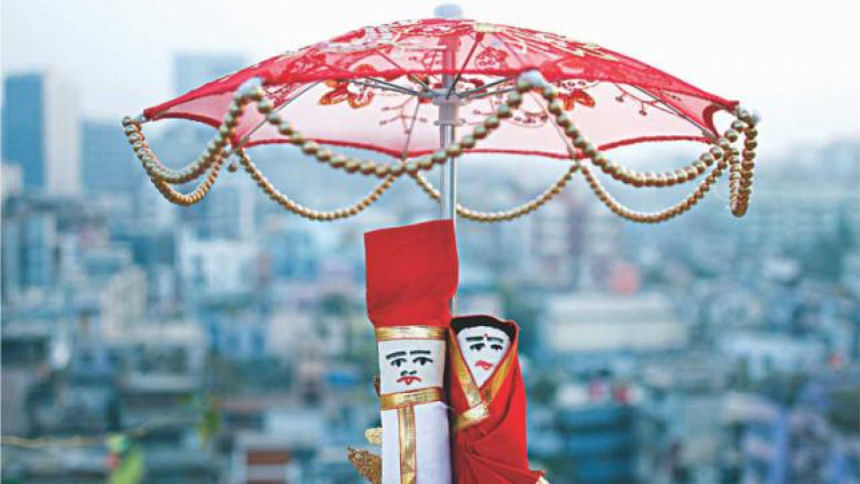A thorn in the flesh

As the Child Marriage Restraint Act is about to be passed in parliament, the government and rights bodies continue to be at loggerheads over a provision that permits wedlock prior to one reaching the minimum marriageable age.
When the cabinet-approved Child Marriage Restraint Act-2016 was placed in Jatiya Sangsad in December and sent to the relevant parliamentary body for scrutiny, it had a provision allowing girls under 18 to be married under “special circumstances”.
On Thursday, the parliamentary standing committee on women and children affairs placed its scrutiny report recommending the same provision for boys as well. This means boys below 21 could get married under “special circumstances”.
Bangladesh Mahila Parishad President Ayesha Khanom fears the law, if passed in its present state, would cause more injustice towards women and people would abuse the provision.
Rebeka Momin, the lawmaker who leads the Jatiya Sangsad body that scrutinised the act, told The Daily Star yesterday, "We have to keep certain provisions in the upcoming law considering current socio-economic condition in the country.
"We did not think it was a good idea to discriminate between male and female and that was why the 'special circumstances', we thought, should be applicable for both. Apart from the exception, the marriage ages remain 21 and 18 for male and female respectively."
She hoped that there would be a day when such a provision would not be required.
Rebeka, a ruling Awami League MP from Netrakona, said “special circumstances” would be clarified once the government publishes a rule through gazette in the light of the new law.
The committee also suggested that in the absence of parents, a girl's or boy's guardians, with a court order, would be able to marry their wards off before they are 21 and 18 for their (the children's) “best interests”, she said.
Rebeka defended the “special circumstances” provision saying, "We will also constitute upazila-level committees, which would educate and raise awareness in communities against early marriage and check any abuse of the provision."
Ayesha Khanom told The Daily Star, "We have engaged with the government on this particular issue many times in the last few years. We submitted memorandum to the prime minister and an alternate draft law on this to the women and children affairs ministry but to no avail.”
She recommended that the government re-evaluate its position before passing the law. “Such a law would impede the progress of women empowerment in the society. We'll see more children bearing child," said Ayesha.
Girls Not Brides, a UK-based global partnership of more than 700 civil society organisations committed to ending child marriage, said, "The Bangladesh Government is concerned that pregnant adolescent girls, particularly in rural areas, would be ostracised by their communities if they could not marry. Allowing marriage in “special cases”, such as pregnancy, is their proposed solution. But marriage does not protect girls. Research consistently shows that child marriage goes hand in hand with dropping out of school, losing out on job opportunities, and experiencing domestic violence."
It further noted that Bangladesh's neighbour, Nepal, increased the age of marriage to 20 and came up with a national strategy to end child marriage, which addresses the concerns that drive parents to marry off their daughters before 20. "The strategy focuses on ensuring quality education for girls, working with families and communities -- including men and boys -- to change mentalities, and ensuring access to government services," it added.
Social Action Committee is a platform of 69 women rights, human rights and development organisations working in the country. While holding a rally protesting the special provision in the proposed Child Marriage Restrain Act at the Central Shahid Minar recently, it said the provision would not only encourage child marriage but also affect children's rights and women empowerment.
According to Unicef, "Early marriage leads to early pregnancy. One third of teenage girls aged 15 to 19 are mothers or are already pregnant (in Bangladesh). Adolescent mothers are more likely to suffer from birthing complications than adult women."
With the exception of a few countries in sub-Saharan Africa, Bangladesh has the highest number of under-aged married girls.

 For all latest news, follow The Daily Star's Google News channel.
For all latest news, follow The Daily Star's Google News channel. 



Comments